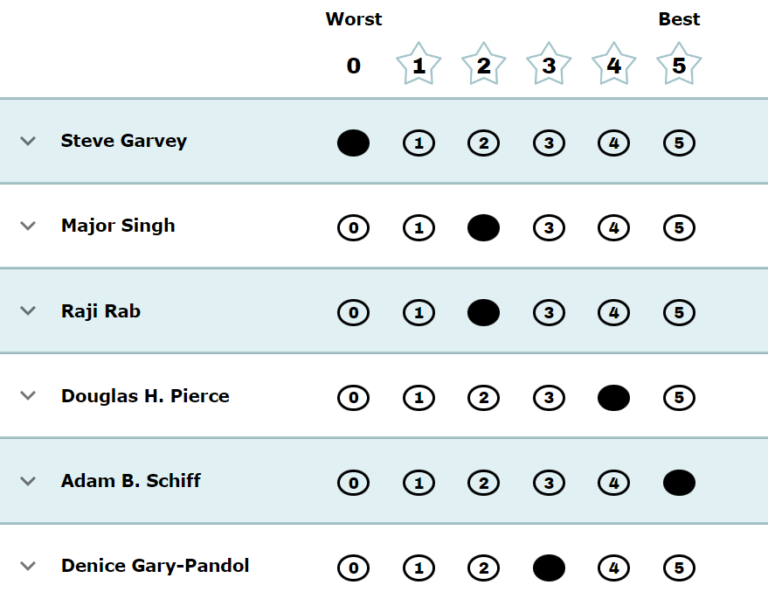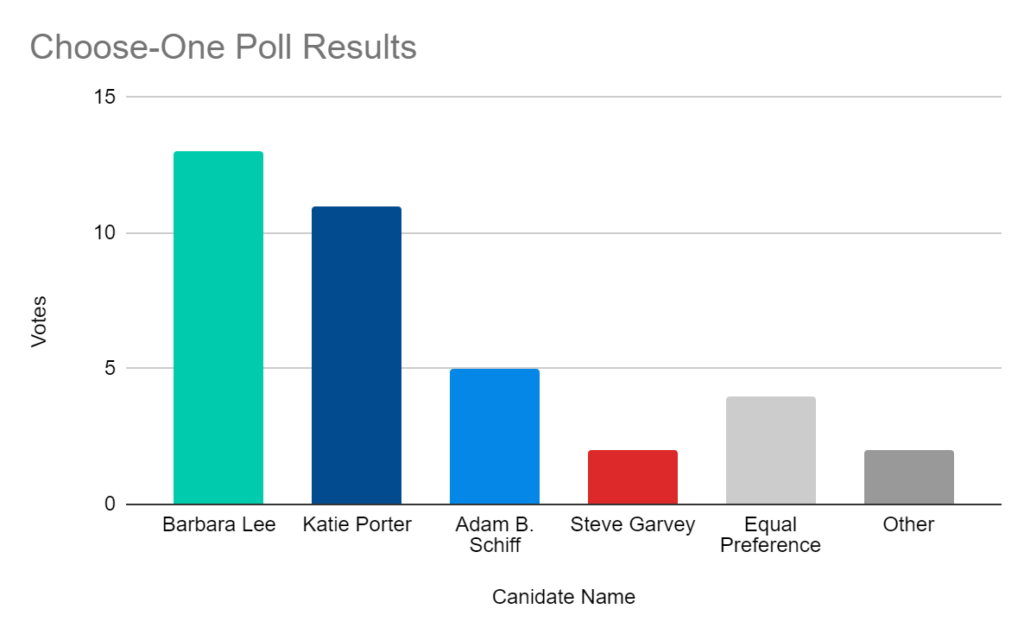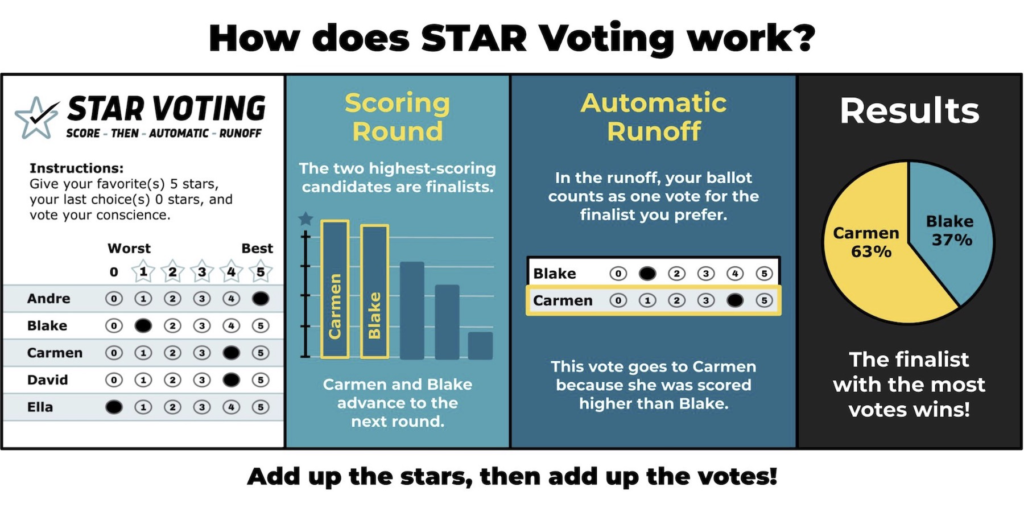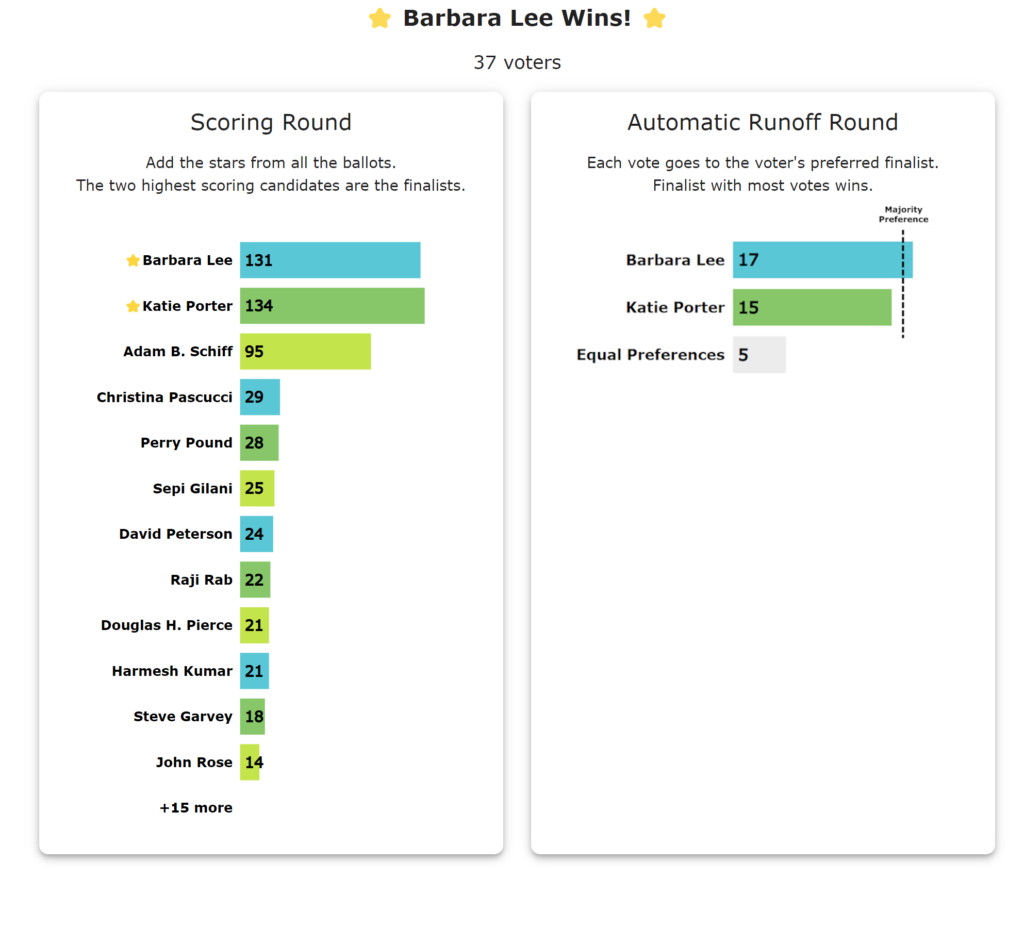How would STAR Voting have impacted the California Senate race?
Last month California had a heated election trying to decide which senatorial candidates would face off for the runoff in November. The election used Choose-One voting, but we ran a parallel poll with STAR Voting to see how that would have changed the dynamics.
Under Choose-One voting, each voter got to pick their favorite and then the 2 candidates with the most votes proceeded to the runoff in November. Choose-One has a well known problem called Vote Splitting, where the political party with the most candidates is at a disadvantage since they’ll split the voters and make it a lot easier for the other side to win. Vote splitting can often leave the majority opinion divided and conquered, handing the win to a minority party, and it leads to some sinister side effects such as favorite betrayal, where voters choose a Lesser-Evil candidate over their favorite, or the spoiler effect, where a losing candidate can “spoil an election” by taking votes from a similar candidate who would have otherwise won.
This is also why Choose-One isn’t compatible with a Well Being economy. Vote splitting causes friction between voters of similar beliefs rather than allowing them to focus on their shared consensus of building toward a better society. STAR voting on the other hand will allow more candidates to run without fear of vote splitting.

In the senate election there were 27 candidates, but we’re mostly going to focus in on the top 4 front runners
- Steve Garvey ( R ): Former professional baseball player and the leading Republican candidate
- Adam Schiff ( D ): U.S. Representative, representing the more moderate wing of the Democratic Party
- Katie Porter ( D ): U.S. Representative representing the progressive wing of the Democratic Party
- Barbara Lee ( D ): U.S. Representative also representing the progressive wing of the Democratic Party
This is a prime scenario for vote splitting. California is primarily a blue state but having 3 candidates splitting the Democratic vote makes it much more likely for a Republican to win. On top of that we also see vote splitting within the democratic party with Adam Schiff unifying the moderate vote and with Katie Porter and Barbara Lee splitting the progressive vote.
With those dynamics ( and some shady campaign financing), we ended up with the following results:

Steve Garvey and Adam Schiff both benefited from unifying the support from their respective bases, whereas Katie Porter and Barbara Lee split their base and trailed in the results.
But what if we used a different method? A method where vote splitting isn’t a problem, and where it’s safe for voters to express their honest opinion? That’s why we ran a parallel poll with STAR Voting to see if things would have played out differently.
Limitations
Some caveats before we proceed
- Left-leaning Bias: The voters in our poll leaned more left than the voters in the actual election. However this was not a randomized study, and therefore it isn’t expected to be representative of how actual Californians would have voted.
Small Sample Size: We had a total of 37 votes, enough to get some interesting data, but it’s still a relatively small sample size.
Choose-One Results

> Example snippet from a ballot. This would count as an Adam Schiff voter if we convert this to a Choose-One ballot
Our voters only used the 5-star ballot, where they could specify a score for each candidate on a range from 0 to 5. However we can still see how this would have played out under Choose-One by only looking at which candidate was scored highest by each of the voters.

We can already see that these results are VERY different from the actual results. Some of this could be explained by the STAR ballot. For example, a Barbara Lee voter might have settled for Katie Porter on a Choose-One ballot, but then showed their honest opinion on a more expressive ballot. However the majority of the deviation is likely due to the sample not being representative. Let’s also elaborate more on the Equal Preference and Other groups.
Equal Preference voters are those who gave their top score to multiple candidates. In our poll three of them gave 5 stars to both Barbara Lee and Katie Porter, while the 4th one gave 5 stars to all of the Democratic candidates. Unfortunately, Choose-One doesn’t support this level of expression, so these voters would have needed to settle for one of them and hide the support for their other favorites.
> In reality the Equal Preference group is even bigger since there were multiple voters who gave a 5 to a front runner as well as a down ballot candidate. However in these cases I made an assumption that they would support the front runner in an actual Choose-One election scenario so I counted them accordingly.
Other voters are those who supported candidates outside of the frontrunners. One was a Sepi Gilani supporter, and the other only gave 5 stars to the candidates with a small business background. Under Choose-One these voters would have had to choose between voting for their honest favorite as a protest vote, or compromising for a different candidate so that their vote can make a difference among the front runners.
As we’re about to see, STAR Voting won’t require these voters to make those compromises.
STAR Voting Results

STAR Voting is always counted in 2 automatic rounds (regardless of the number of candidates). In the first round we add up the Stars across all candidates, and the two highest scoring candidates become finalists in the next round. In the second round each vote gets counted toward whichever finalist they most preferred. This allows each voter to have an equal voice in the runoff round, regardless of how strong their preference is. In the example we see that the example ballot was counted toward Carmen in the final round even though their favorite was Andre.

When we apply the same process to our poll Barbara Lee wins! The scoring round shows us the full support behind each of the candidates, rather than just the first choice support. Barbara Lee and Katie Porter still arise as the front runners, but Adam Schiff and other down ballot democrats got a boost because the voters in this race were able to show their level of preference for ALL the candidates instead of just the frontrunners. This also meant that Steve Garvey got buried down to 11th place with 18 points. This also feels more accurate. Any generic Democratic would likely still win against a Republican in a California general election, so that’s why we see so many lesser known democrats ranked above Garvey. (See Appendix A for my take on how we could adjust this poll to be more fair for Republicans)
Then we enter the runoff round. When it’s just a head-to-head between Barbara Lee and Katie Porter, we see that the majority of voters who had a preference preferred Lee over Porter, so Barbara Lee wins! The runoff round is particularly important for Steve Garvey voters. On average they gave Porter 0.5 stars and Barbara Lee 0 stars. This has a negligible impact on the finalists in the scoring round, but in the runoff round their full vote gets cast to Porter since that’s the candidate they preferred. And remember that down ballot voter who only gave their 5 star votes to small business owners? They also gave Lee 2 stars and Porter 0 stars. So in both cases these voters didn’t have to decide between casting a protest vote and casting a vote that would make a difference, with STAR Voting they got to do both!
Why Did Katie Porter Have The Highest Score In The Scoring Round?
Porter and Lee were the finalists because they both got high scores across the board. If we define giving 4 or 5 stars as strong support, then 24 voters, 64%, strongly supported both. However there were also 3 voters who only scored Porter highly, whereas there were no corresponding voters that only gave Lee strong support.

This gave Porter an edge in the scoring round, since a 5 star Porter, 0 star Lee vote is going to make a bigger impact on the difference between the finalists than a 5 star Lee, 4 star Porter vote. However this bias goes away in the runoff round where every vote is weighted equally. A 5 star Lee, 4 star Porter vote is going to count as 1 full vote for Lee, and a 5 star Porter, 0 star Lee vote is going to count as 1 full vote for Porter.
This reveals why the runoff round is important. The 5 star Lee, 4 star Porter voters were penalized for showing their true preference. If we only had the scoring round we may have seen more Lee voters strategically reduce their score for Porter (i.e. burying), so they could have more impact.
This incentive to min-max your scores with only a scoring round of voting really reduces the benefits of having such an expressive ballot. But under STAR Voting, honesty is the best strategy. The added runoff elegantly balances the voter incentives so that they are encouraged to show their honest preference on their ballot instead of min-maxing.
Summary
So that’s how a STAR Voting election would go. Even with a small dataset we can already see some major improvements over Choose-One voting. Choose-One voting had major vote splitting, but with STAR Voting voters can support their favorite without having to worry about vote splitting. We’ve also seen that STAR Voting encourages voters to vote honestly all the way down the ballot, because in the final round every voter has an equal voice. Allowing all voices to be heard allows the consensus opinion to surface, and these are the conditions that will help lead us toward a Well Being economy.
Learn more about a Well Being Economy: https://weallcalifornia.org/
Learn more about STAR Voting: https://starvoting.org
Further Reading
Analyzing the CA Senate election with an Approval poll: https://electionscience.org/commentary-analysis/approval-voting-unmasks-consensus-opinion-in-the-california-primary/
Chicago poll comparing STAR, Approval, RCV, and Choose-One: https://samhyson.medium.com/comparing-4-voting-methods-chicago-mayoral-election-2023-ca8303e79854
Appendix A: Was This Poll Fair To Republicans?
They were certainly under-represented in this poll, which partially accounts for these results. But the poll also differs from the actual election in that it’s trying to pick a winner, whereas the actual election was just trying to reduce the pool of candidates for the run-off.
With STAR Voting the primary is no longer necessary. We could have moved all these candidates to the general, and skip the expensive primary entirely.
However some jurisdictions might still opt for a primary in the interest of having a smaller pool of candidates for the general election (especially when there’s a crowded pool of 27 candidates). In that scenario it could be a good idea to use normal STAR Voting in the runoff but use a proportional multi-winner method in the primary (such as STAR-PR). For example, let’s say that we’re selecting 5 candidates for the general election, and the previous gubernatorial election showed us that Californian’s tend to vote 60% Democrat, and 40% Republican. A proportional voting system would ensure that 3 Democrats and 2 Republicans are selected for the runoff. This would still likely result in a Democratic winning in the general election, but a proportional representation approach will at least ensure that Republicans get a more fair shot at having their voice heard.

